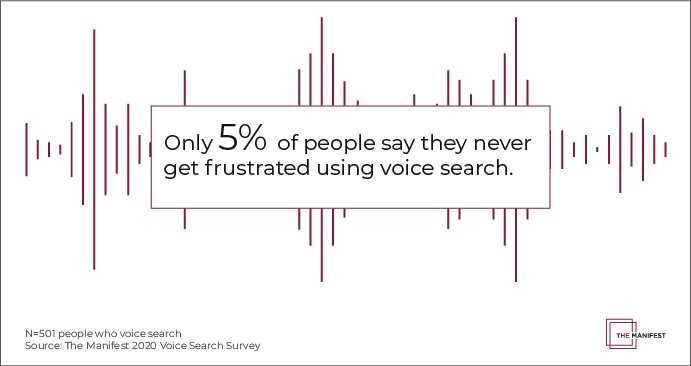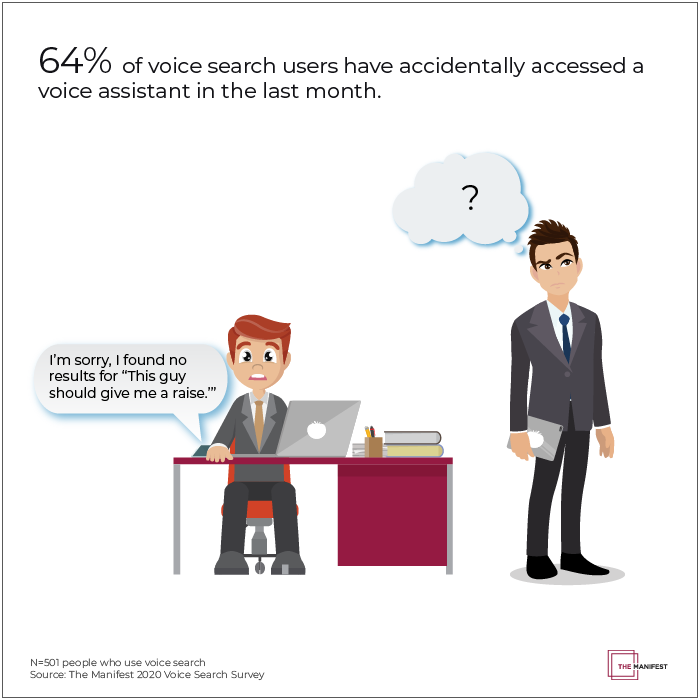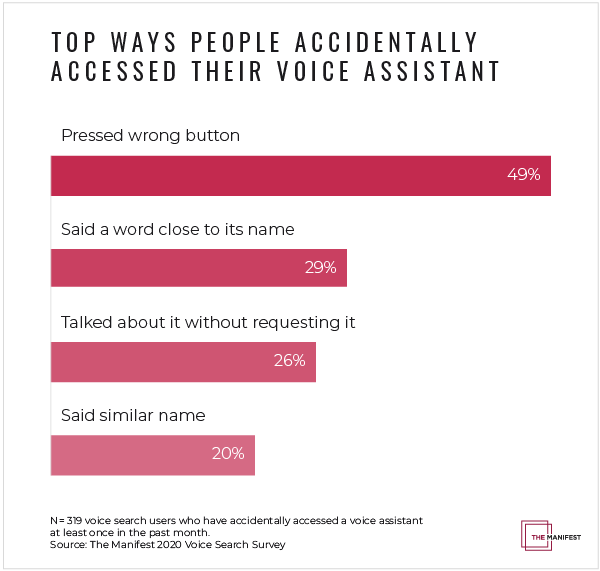Siri and Alexa Fails: Frustrations With Voice Search

Siri and Alexa Fails: Frustrations With Voice Search
Voice search capabilities change the way people can look for things online, but this technology is far from perfect. Most people experience frustrations when conducting search by voice and have accidentally summoned their voice assistants, known as “false positives,” resulting in funny, embarrassing, and awkward situations. Experts, however, are hopeful voice search technology will improve in 2020, especially as technology gets better at understanding search queries.
Sneh Ratna Choudhary wanted to know two things: how tall Mount Everest is and where she could buy a hairbrush in Bangalore, India.
She decided to turn to voice search to avoid exacerbating her carpal tunnel by typing out her queries.
To her first query, Google Assistant promptly answered “8,848 meters.”
To her second query about where she could buy a hairbrush, however, she received irrelevant answers: Google Assistant showed her cosmetic stores and nearby salons, while Siri showed a list of nearby pharmacies, none of which she was looking for.
“I had issues with the assistant not being able to understand my words entirely when the searches got longer,” Choudhary, a content marketer at Beaconstac, said. “I made an effort to speak slowly and enunciate my words, but, then again, I could have probably typed in my query and found the answer much faster.”
I had issues with the assistant not being able to understand my words entirely when the searches got longer.
The Manifest surveyed 501 people who have used voice search to learn what they search for when they use it, their overall satisfaction with the results, and frustrations with the technology they experience.
Our Findings
- Only 5% of voice search users report never experiencing frustration using the technology, highlighting that the technology is far from perfect.
- Nearly two-thirds (64%) of people have accidentally accessed a voice assistant in the last month.
- People accidentally access voice assistants because they press the wrong button (49%), the voice assistant thinks it heard its name (29%), they talk about the voice assistant without requesting it (26%), or they say a similar name (e.g., Sarah for Siri or Alex for Alexa) (20%).
Frustrations With Voice Search Are Common
Most people who have used voice search can likely relate to Choudhary’s frustrations: What seems to be a simple query such as where to buy a hairbrush can yield unhelpful results.
Only 5% of people say they never get frustrated when using voice search.

The remaining 95% experience frustration when using voice search, citing reasons such as accidentally summoning their voice assistant or their voice assistant not understanding or misunderstanding their query.
“Voice search is not perfect, just as any search is not perfect,” said Andrew Selepak, director of MAMC Social Media. “The thing to remember is that voice search can handle who, what, when, and where questions but is still limited and unable to really handle why and how questions.”
Voice search can handle who, what, when, and where questions but is still limited and unable to really handle why and how questions.
Voice search can be useful for queries with a concrete, simple answer such as the height of Mt. Everest but may not be able to process more complex queries such as where to buy a hairbrush.
This is especially problematic because voice search results yield only one response compared to the choice of results users see when conducting text-based searches.
“While simple searches are great for voice search, more complicated and nuanced questions should still be saved for your phone or computer,” Selepak said. “But so long as you want the weather or a sports score, go ahead and ask Google or Alexa, and get the answer you want without having to look at a screen. “
Users may have better luck getting satisfying voice search results to simple queries, while many experts recommend using text-based searches for more complex searches. Experts are hopeful that fewer people will experience frustration with voice search as voice technology improves and search engines get better at understanding natural language.
Voice Technology Is Getting Better at Natural Language Processing
On Oct. 25, 2019, Google announced the release of updates to BERT, or Bidirectional Encoder Representations from Transformers. BERT will improve the accuracy of all searches, both voice and text, because of its focus on natural language processing.
BERT improves Google’s ability to process natural language and understand search queries that use words such as “for” or “to,” which can change the meaning (or direction) of a phrase.
For example, before the BERT update, if someone searched “math practice books for adults,” they may have been shown the same results as someone who searched for “math practice books.”

The word “for” in the search query provides direction for the search engine. This searcher wants a math practice book specifically for adults, not students in grades 6-8.
Illia Termeno, director of Extrabrains marketing agency, used the example of “travel itinerary to Greece” versus “travel itinerary in Greece,” highlighting how the prepositions “to” and “in” change the meaning of the phrase.
Someone searching for a travel itinerary to Greece wants to get from a different country to Greece, while someone searching for a travel itinerary in Greece wants to find interesting things to do or see when they’re already there.
“This update means we need to continue creating content that precisely answers the intent of the target audience that we create this content for,” Termeno said.
Search results, including those from voice searches, will become more precise as Google becomes better at natural language processing and understanding user intent.
Voice Search Assistants Are Often Summoned Unintentionally
Joshua Liljenquist is a senior at Minnesota State University in Mankato, Minn. His professor walked into his class sophomore year and began to review the syllabus. He forbade the students from taking photos for note-taking purposes during the lecture, threatening expulsion.
Liljenquist was shocked and whispered to the person next to him, “This guy is kind of an a------.”
The lecture hall was silent when, suddenly, Liljenquist’s Siri, trying to be helpful, said, "I found no results for ‘This guy is kind of an a------.’”
“A wrinkle in my jeans must have set off Siri … My face turned bright red as I wanted to grab my things and sprint out of the classroom,” Liljenquist said. “I don't think the timing could be any worse.”
Liljenquist is not alone — 64% of voice search users have accidentally accessed a voice assistant in the last month.

Nearly half of people who accessed a voice assistant accidentally (49%) did so by pressing the wrong button.

Other people accidentally summon their voice assistants, triggering false positives, when
- Their voice assistant thinks it heard its name (29%)
- They talk about the voice assistant without requesting it (26%)
- They say a similar name to the voice assistant (e.g., Alex for Alexa) (20%)
The frequency of false positives has required some people to adopt nicknames to avoid confusing their voice assistant.
For example, when Barbara Nevers’ niece Alexa visits, her Amazon Alexa gets confused.
“One time, my husband asked [our niece Alexa] what kind of pizza she wanted, and the Echo offered to help us order Domino’s,” Nevers, founder of NeoLittle, a parenting website, said.
Now, the Nevers usually have to turn off their Amazon Echo when their niece visits, but when they want to play music in the background, they’ll shorten their niece’s name to “Al” to avoid confusion.
Like unhelpful search results, false positives can be a source of frustration for voice technology users. Frustrations with voice assistants such as Siri and Alexa are so common that they have become a trending topic of conversation on social media, using the hashtag #AlexaFails and #SiriFails.
Siri and Alexa Fails Are Prevalent in Today’s Pop Culture
Unintentionally activating voice assistants has become a running joke in today’s pop culture, reinforced by the South Park episode “White People Renovating Houses” that pranked viewers who owned smart speakers by setting early alarms and adding inappropriate items to their Amazon shopping lists.

Most voice assistant users have experienced false positives, and many document their Alexa fails and Siri fails on social media.
It appears the technology industry is aware of these glitches and is developing solutions. For example, Amazon has discovered a strategy to prevent its Alexa commercials from triggering viewers’ Amazon Echos.
In the 2018 Amazon Super Bowl commercial “Alexa Loses Her Voice,” “Alexa” was said 10 times but didn’t trigger anyone’s Amazon Echo.

An Amazon spokesperson told Bloomberg in February 2018 that Amazon alters its advertisements to reduce the risk of false positives but didn’t explain how.
Reddit user aspyhackr, however, speculates that Amazon achieves this by muting its commercials to the 3,000Hz to 6,000Hz range. This quieter range signals to “Alexa” that what’s being said is not a command.
Experts Are Hopeful Voice Search Technology Will Improve in 2020
Voice search technology has come a long way since Bell Labs’ Speech Recognition System, Audrey, was introduced in 1952 as the first machine that could understand speech (even if only numbers zero to nine), but experiences such as Choudhary’s and Nevers’ remind us that there’s still room for improvement.
Most people experience frustrations with voice technology, and these frustrations stem from imperfect voice search results and accidentally accessing voice assistants, resulting in potentially embarrassing or inconvenient situations.
Technology, however, is getting better at natural language processing, and companies are experimenting with ways to program voice assistants to better understand the difference between a command and passing comment.
In 2020, this technology will likely improve, encouraging people to rely on it more frequently.
About the Survey
The Manifest surveyed 501 voice search users in the U.S.
Most survey respondents are female (55%), and 45% are male.
About 22% of respondents are ages 18-34; 33% are ages 35-54; and 45% are ages 55+.
